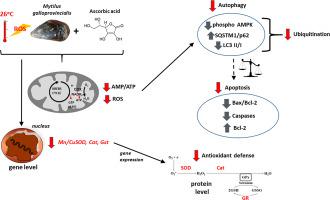Comparative Biochemistry and Physiology B: Biochemistry & Molecular Biology ( IF 1.9 ) Pub Date : 2021-05-07 , DOI: 10.1016/j.cbpb.2021.110611 Konstantinos Feidantsis 1 , Ioannis Georgoulis 1 , Ioannis A Giantsis 2 , Basile Michaelidis 1

|
Considering temperature's upcoming increase due to climate change, combined with the fact that Mediterranean mussels Mytilus galloprovincialis (Lamarck, 1819) live at their upper limits [critical temperatures (Tc) beyond 25 °C], we cannot be sure of this species' sustainable future in the Mediterranean Sea. Deviation from optimum temperatures leads to cellular damage due to oxidative stress. Although ascorbic acid (AA) is a major scavenger of reactive oxygen species (ROS), its capacity to minimize oxidative stress effects is scarcely studied in aquatic organisms. Thus, treatment with 5 mM and 10 mM AA of thermally stressed molluscs had been employed in order to examine its antioxidant capacity. While 5 mM had no effect, 10 mM normalized COX1 and ND2 relative mRNA levels, and superoxide dismutase (SOD), catalase, and glutathione reductase (GR) enzymatic activity levels in both examined tissues: posterior adductor muscle (PAM) and mantle. ATP levels, probably providing the adequate energy for antioxidant defence in thermally stressed mussels, is also normalized under 10 mM AA treatment. Moreover, autophagic indicators such as LC3 II/I and SQSTM1/p62 levels are normalized, indicating autophagy amelioration. Apoptosis also seems to be inhibited since both Bax/Bcl-2 and cleaved caspase substrate levels decrease with 10 mM AA treatment. Therefore, treatment of mussels with AA seems to produce threshold effects, although the precise underlying mechanisms must be elucidated in future studies. These findings show that treatment of mussels with effective antioxidants can be useful as a strategic approach for the reduction of the deleterious effects on mussels' summer mortality in aquaculture zones.
中文翻译:

用抗坏血酸处理使受热应激的贻贝的有氧能力、抗氧化防御和细胞死亡途径正常化
考虑到气候变化导致温度即将升高,再加上地中海贻贝Mytilus galloprovincialis (Lamarck, 1819) 生活在其上限 [临界温度 (Tc) 超过 25 °C],我们无法确定该物种的可持续未来在地中海。由于氧化应激,偏离最佳温度会导致细胞损伤。尽管抗坏血酸 (AA) 是活性氧 (ROS) 的主要清除剂,但在水生生物中很少研究其将氧化应激效应降至最低的能力。因此,已采用 5 mM 和 10 mM AA 的热应激软体动物处理,以检查其抗氧化能力。虽然 5 mM 没有影响,但 10 mM 归一化COX1和ND2相对 mRNA 水平,以及超氧化物歧化酶 (SOD)、过氧化氢酶和谷胱甘肽还原酶 (GR) 在两种检查组织中的酶活性水平:后收肌 (PAM) 和地幔。ATP 水平可能为热应激贻贝的抗氧化防御提供足够的能量,也在 10 mM AA 处理下正常化。此外,自噬指标如 LC3 II/I 和 SQSTM1/p62 水平被标准化,表明自噬改善。细胞凋亡似乎也受到抑制,因为 Bax/Bcl-2 和裂解的半胱天冬酶底物水平随着 10 mM AA 处理而降低。因此,用 AA 处理贻贝似乎会产生阈值效应,尽管在未来的研究中必须阐明确切的潜在机制。这些发现表明治疗有效的抗氧化剂贻贝可以作为对贻贝的不利影响减少的战略方针有用的“水产养殖区夏季死亡率。











































 京公网安备 11010802027423号
京公网安备 11010802027423号